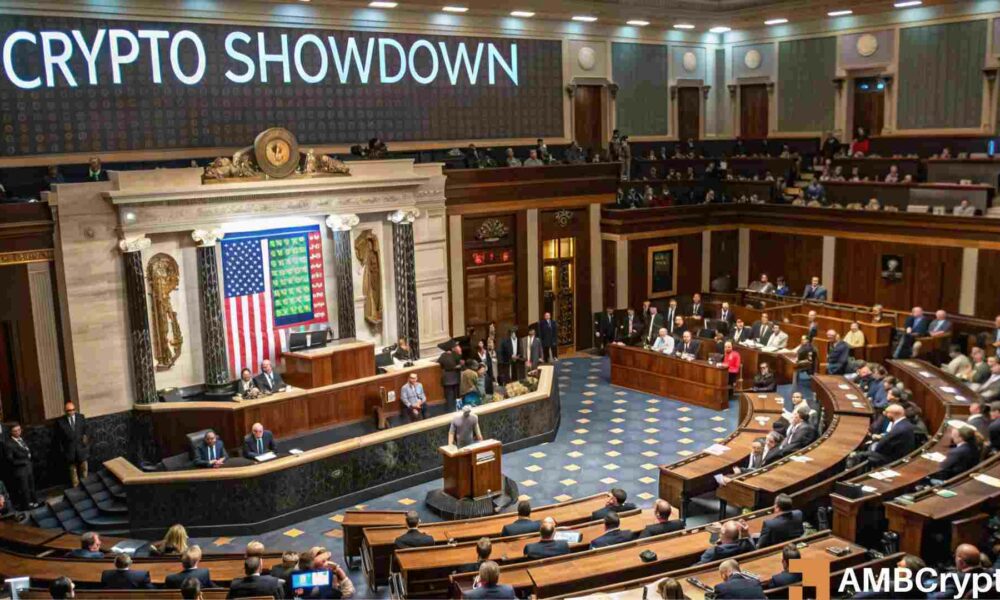The Clash Over Crypto Legislation: A Bipartisan Battle Unfolds
In a dramatic turn of events, the U.S. Congress faces a pending showdown regarding crucial cryptocurrency legislation, with the GENIUS Act and the CLARITY Act at the epicenter of the debate. Set to unfold from July 15th, the fight features Democrats, led by notable lawmakers Maxine Waters and Stephen Lynch, who have declared their intent to block these bills. They label them as ‘dangerous’ and potential enablers of fraud, particularly presenting concerns tied to President Trump’s crypto-related ventures. As the debate rages on, will Republicans be able to push through legislation aimed at regulating and clarifying the crypto market, or will Democratic resistance be too strong?
The backdrop of the current legislative contention is a planned ‘Crypto Week’ in the House, orchestrated by Republicans aiming for expedited passage of crypto bills, including the aforementioned GENIUS Act. This act has already cleared the Senate and is now under consideration in the House, where its approval would send it directly to the President’s desk. Conversely, the CLARITY Act, which addresses market structure in the crypto space, awaits its review by the House before proceeding to the Senate. Both parties must navigate a complex legislative landscape where amendments could derail progress, a move that Republican leaders appear eager to avoid.
Democrats have raised strong objections to what they see as a blatant attempt by the GOP to legitimize President Trump’s controversial financial dealings within the cryptocurrency domain. In light of their concerns, Waters and Lynch have proclaimed it an ‘anti-crypto corruption week,’ aiming to shine a light on alleged fraud tied to Trump-affiliated crypto ventures. According to Democrats, these bills could pave the way for significant financial malfeasance, citing the staggering $1.2 billion reportedly benefiting Trump from these endeavors. Furthermore, some investors find themselves in dire straits, with losses linked to ventures like the Official Trump [TRUMP] memecoin.
In addition to the discussions surrounding the GENIUS and CLARITY Acts, Congress is also set to address an anti-central bank digital currency (CBDC) bill aimed at halting state surveillance tactics linked to digital currencies. This has become a focal point of contention for lawmakers on both sides. While Republicans argue that this type of regulation protects consumers’ freedoms, Democrats denounce the overriding potential for these bills to exploit vulnerable investors and further entrench dishonesty in the crypto market. The vehement critiques underscore a deeply divided opinion on the relation between cryptocurrency and public trust.
Looking ahead, despite previous attempts by Democrats to propose measures against what they perceive as "Trump crypto frauds," none have garnered significant momentum thus far. This ongoing stalemate comes as Republicans showcase recent legislative victories, including the ‘Big Beautiful Bill’ and the passage of the GENIUS Act amid significant opposition. The resilience of the crypto lobby appears formidable, having affected the Senate’s support for these bills, with party leaders expressing confidence that these initiatives will soon achieve legal status, potentially by August or September.
In conclusion, the clash over cryptocurrency legislation encapsulates broader ongoing tensions within U.S. politics, reflecting divergent priorities and philosophies regarding financial innovation, regulation, and consumer protection. As the two parties gear up for this pivotal legislative battle, all eyes are on Congress to see whether Republicans can carry the momentum they’ve built, or whether Democratic resistance will reshape the landscape of cryptocurrency regulation in America. With stakes so high for the future of crypto, the upcoming weeks will undoubtedly prove crucial in determining the partnership—and the friction—between politics and emerging financial technologies.


